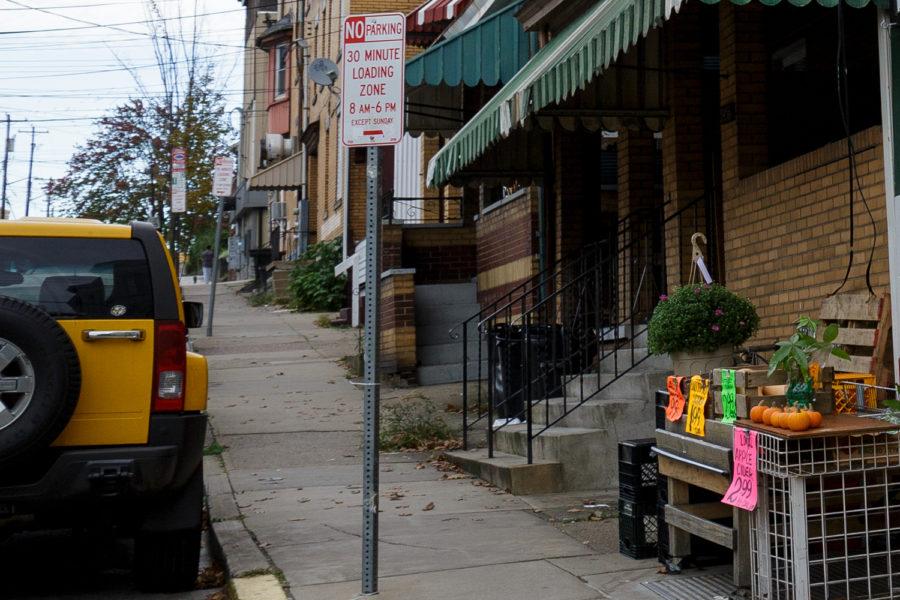Opinion | South Oakland could be beautiful if we just tried
Bates Street in South Oakland.
August 20, 2019
South Oakland is a popular destination for Pitt students living on their own for the first time. It’s as close to the University as off-campus housing can get, with the average walk to school clocking in at about 10 minutes, and rent doesn’t get too bad. Yet a good deal of students are willing to undergo a longer commute for other neighborhoods in Pittsburgh like Shadyside or Squirrel Hill.
It’s understandable — walk along a South O avenue and you’ll notice a plethora of overflowing trash cans and unmowed lawns. Long-term residents have often had issues with the transient student population concerning the upkeep of the neighborhood.
On one hand, it’s hard to expect students to be masters of home maintenance — college often marks the first time people live in their own homes without an older guardian, so most don’t even know what they’re doing half of the time when it comes to maintaining their living space.
But the job of a student is to learn, and we shouldn’t settle for a failing grade when it comes to the places we’re inhabiting. If we, as college students, can rally our numbers to be more responsible neighbors, it would become a nicer place for everyone to live, if only for a brief while.
Taking care of personal trash can be as simple as setting a few alarms or weekly reminders. The City provides guidelines on what garbage counts as general refuse, recycling and yard debris, and a website to determine collection day by street address and zip code. Students can make the best use of these resources to plan any parties or social gatherings that might generate a lot of trash with when collection day is just around the corner. This can help avoid trash buildup either in the home or spilling out on the curb.
Yard work can be a little trickier as many students either live in apartment buildings that may not have any green spaces to take care of or any yard work is covered by the landlord services. But if landscaping is not covered in the leasing forms and the state of the yard has become a bit dismal, it can’t hurt to pull a few weeds. Maybe hold off on taking a buzzsaw to the bushes, but weeds are relatively harmless and only requires a pair of sturdy gloves as equipment.
This goes the same for dealing with snowy sidewalks in the winter months. Most landlords will take care of shoveling snow and salting away ice, but if snow falls overnight or early morning, it may take them a couple of hours to address the problem. If someone in the building has a shovel and the time, the hard work and kindness would probably be appreciated by everyone who walks down the street.
It is inevitable, however, that garbage or untamed wildlife will inhabit public spaces. It may be no one’s fault in particular in how it got there but is now a part of everyone’s responsibility to clean it up. Pitt has quite a few volunteer events dedicated to this responsibility like Pitt Make a Difference Day in the fall and Be a Good Neighbor Day in the spring, both of which send thousands of students to every corner of Pittsburgh to help out neighborhoods and teach the theme of community engagement.
Programs like these are great stepping stones to becoming more involved with neighborhood communities as they make the challenge fun and easy. To join in and help out with such events, students need only to sign up, often with a team, by the deadline and then show up for work. The PittServes office organizes the volunteer events by identifying problems, arranging local guides, dividing up task forces and providing transportation to and from the site.
If students are interested in long-term community volunteering, there are neighborhood councils and committees that work on beautification, quality of life complaints and daily social events to keep Pittsburgh safe, healthy and vibrant. Oakwatch is one of the more prominent committees in Oakland that is focused on hosting a dialogue between the residents, property owners and institutions that reside in the neighborhood.
It is always looking for volunteers to help with its many projects such as Adopt-a-Block, the Oakland Tree and Garden team and snow removal. Signups start on its website, and volunteers can specify which projects they are interested in getting involved. Volunteers can also suggest new ways they would like to help if none of the existing projects target their concerns.
But students do not have to volunteer with Oakwatch to have a voice in the conversation and management of the Oakland neighborhood. Oakwatch meetings are held every third Wednesday of the month, but the time and location of meetings vary month to month. To stay updated about the next meeting or any changes that may occur, there is a monthly calendar or an email list people can sign up for.
University life is an experience that asks for a tremendous amount of self-reflection, but wherever we live, we will be a part of a greater community. Our communities will be what we make of them, so there is no time like the present to start getting in some practice — especially when there are so many opportunities waiting to help you get started.



